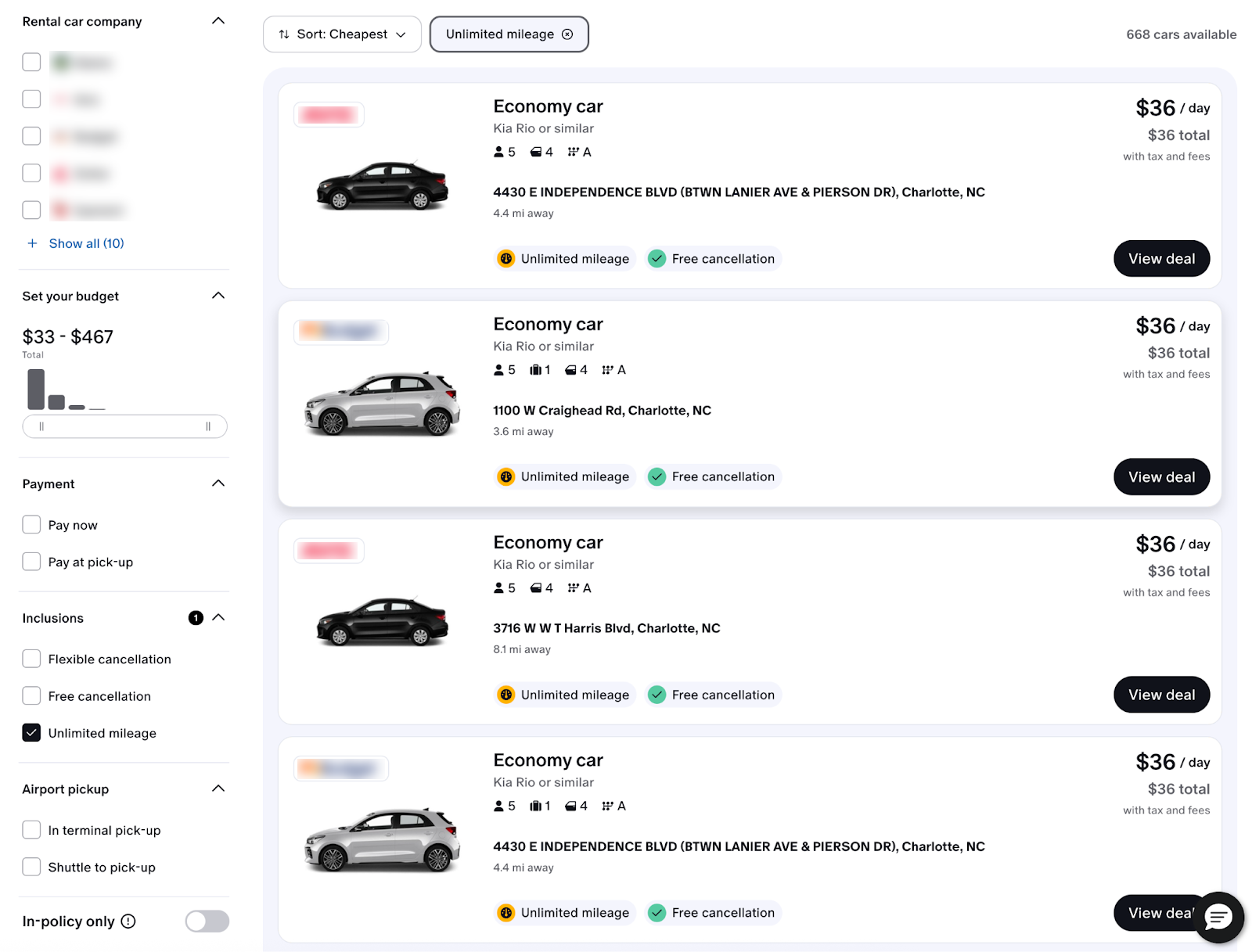Rental Car Mileage Fees: What You Need to Know For Crew Travel

You just watched your project budget get destroyed by $847 in rental car mileage fees you never saw coming. Your crew drove between three job sites over two weeks, turning those 2,100 miles into a financial nightmare.
Now you're scrambling to explain cost overruns while finance is furious.
The worst part? Your competition just won the next bid by $30,000, probably because they didn't get blindsided by surprise fees.
Here's how to protect your project budgets from mileage fees, stay IRS compliant, and avoid the surprises that destroy margins.
Do Rental Cars Charge Per Mile?
Most standard rentals don't charge per mile. Companies know you'd book elsewhere if they nickel-and-dime every mile. Book a sedan or economy car from well-known brands like Hertz, Thrifty, or Avis and drive all week without mileage fees.

But mileage fees do apply to:
- Large SUVs and cargo vans (usually capped at 150-200 miles/day)
- Premium vehicles and specialty trucks
- One-way rentals (they have to move the car back somehow)
- Weekend promotions with buried caps
When mileage fees hit, expect $0.10-$0.75 per mile. That adds up fast when your crew is driving between job sites.
Pro Tip: "Unlimited" doesn't always mean unlimited. For instance, one-way rentals often have stricter mileage limits or higher per-mile charges.
How Mileage Caps Work
Daily Caps vs. Total Mileage Limits
Daily mileage caps destroy project budgets without warning. Some contracts offer 150 miles per day. Sounds reasonable until you realize that's only 750 miles for a five-day rental.
If your project requires 1,200 miles, you're paying extra for those last 450 miles.
Hidden Fee Traps That Wreck Budgets
- Weekend specials with buried 100-mile daily caps
- Promotional codes that void unlimited policies
- Cross-border restrictions that kick in without warning
Your crew books what looks like a $200 rental, then gets slammed with $150 in mileage overages because nobody caught the weekend special restrictions.
Calculate Your True Rental Costs
The headline rate on a booking site looks cheap, until you add everything that shows up on the invoice. Here's how they destroy your budget:
- Day 1: You see $45/day and think "Perfect, fits the budget"
- Day 5: Your crew returns the keys
- Day 10: The invoice hits your desk at $540 (vs. $225 advertised)
Your advertised rate just more than doubled.
Before you hand keys to your crew, run the math on these components:
Base rate + mileage fees + insurance + fuel + taxes + surcharges
Avoid Insurance Double-Billing
Counter agents push collision waivers that run $10-$30 a day. If your company card or fleet policy already covers damage, you're paying twice for the same protection.
Protect Your Budget From Mileage Fees
Book Strategically
- Book early to secure unlimited-mileage deals before they're gone
- Choose vehicle class strategically—that pickup truck might seem necessary, but if a standard car works, you avoid per-mile charges entirely
- Plan routes to minimize unnecessary travel between job sites
- Consider longer rental periods for better mileage terms
Run the Break-Even Analysis
If your crew drives 800 miles, reimbursement alone costs $560. A capped rental with overage charges might cost more than just paying mileage.
Always build a 20% cost cushion for timeline changes. Construction and project work rarely goes exactly as planned.
IRS Compliance for Business Mileage
Your concrete finisher drives 600 miles between job sites, then extends the weekend to visit his kids three states over. Fast-forward six months, you're sitting across from an IRS auditor who wants proof that 847 miles were business-related.
This costs real money:
- IRS disallows $593 in mileage deductions ($847 × $0.70)
- Penalty fees: $178 (30% of disallowed amount)
- Accountant time to fight it: $450 (6 hours at $75/hour)
- Total damage: $1,221 from one poorly documented trip
The Key Rule Most Managers Miss
You can't claim both rental costs AND mileage deduction for the same trip. Pick one method and stick with it. The 2025 IRS standard mileage rate sits at $0.70 per mile, but documentation requirements are non-negotiable.
Document Everything
You need mileage logs showing:
- Business purpose for each trip
- Dates and destinations
- Odometer readings at start and end
- Separation of business vs. personal miles
Your compliance checklist:
- Snap the odometer at pickup and return
- Record each business stop with purpose and miles
- Tag personal side trips separately
- Maintain separate records for any non-business usage
- Choose either rental costs OR mileage deduction for tax filing—never both
Hold on to those logs for at least five tax years, according to IRS record-keeping requirements.
Handle Timeline Changes Without Penalties
Job sites don't follow a neat calendar. A rain-soaked week, a busted crane, or a last-minute client demand can blow up your perfect travel plan.
But the rental counter's clock keeps ticking, and they'll happily charge you for every minute you miss.
Modification Penalties
Timeline changes trigger expensive penalty traps. Your concrete pour gets delayed by rain, but the rental counter doesn't care. They'll charge you $150 in change fees plus $200 in extension penalties. One weather delay just cost your project $350 in rental penalties.
Common Scenarios That Destroy Budgets
- Weather delays extending 3-day rental to 2 weeks
- Equipment failures requiring immediate crew relocation
- Client changes demanding different vehicle types mid-project
- Permit delays forcing crews to return vehicles early
Ways to Protect Yourself
- Get modification confirmations in writing before deadlines
- Document which fees are waivable for weather delays
- Plan backup transportation for critical project timelines
How Engine Eliminates Rental Car Surprises
You've been burned before. That $39-a-day rate turned into $127 at drop-off. The "unlimited mileage" with a 150-mile daily cap buried on page 8 of the contract.
Engine reduces those budget surprises by providing clearer cost visibility and showing you consolidated pricing upfront, not just the marketing rate.
If a specialty truck comes with a 200-mile ceiling, you'll know it. If a standard sedan is legitimately unlimited, you'll know that too.
Eliminate Paperwork Nightmares
- Custom fields tag each charge to your specific job codes
- Direct Bill eliminates receipt collection entirely
- When finance asks for backup, you get unified invoicing
Engine works with 40+ major rental car companies and loyalty programs as well as your existing corporate codes. Once you add your accounts, Engine applies your negotiated rates and passes through loyalty earnings automatically.
Ready for rental car management? See how Engine's consolidated booking and automated tracking works for project-based teams.

Frequently Asked Questions
What rental car loyalty programs work best for construction crews?
Enterprise Plus and National Emerald Club offer the best perks for frequent business travelers, including free upgrades and expedited pickup.
How do I dispute surprise mileage charges after returning the vehicle?
Contact the rental company within 30 days with your original reservation confirmation. Document any policy discrepancies and escalate to corporate if needed.
Can I negotiate better rates for multiple vehicle rentals?
Yes. Companies often provide volume discounts for 5+ vehicles or extended contracts. Ask about corporate accounts even for smaller operations.










.avif)










.avif)





.avif)


